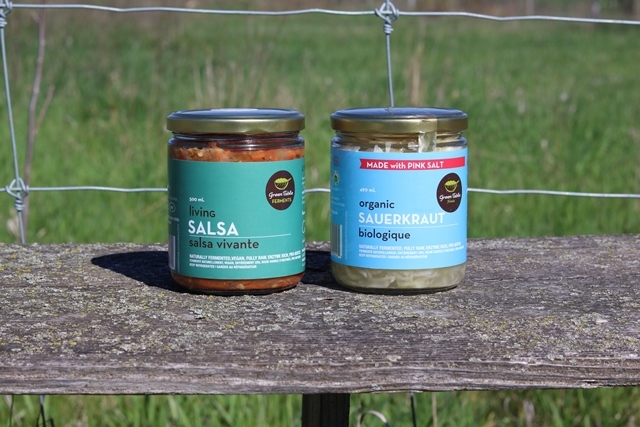
Features
Production
Profiles
Fermented foods preserve old-world process to create new, local markets
August 28, 2017 By AgInnovation Ontario
 AgInnovation Ontario
AgInnovation OntarioAugust 28, 2017, Guelph, Ont. – When Josh Whitehead and Caroline Pilon started selling homemade kimchi at the Guelph Farmers’ Market about 12 years ago, they were simply doing something they loved.
Word spread about their Korean-style fermented sauerkraut and their business quickly grew.
“We stumbled into making food for the retail market,” said Whitehead, co-founder of Green Table Foods together with his wife Caroline. “We didn’t set out to try and change trends. I’d been making kimchi since I was about 15 years old, and we just wanted to make something we loved.”
Their first big customer was the Ontario Natural Food Co-op, looking for a private label to manufacture organic sauerkraut. They formulated three recipes that fit the organization’s requirement for 100 per cent organic and 100 per cent Ontario, and started manufacturing in 2009.
Kimchi and the other fermented vegetables may be newer foods for North Americans, but according to Whitehead, it is one of the oldest food categories in existence. No cooking is used to produce their products, retaining more of the vitamins, nutrients and antioxidants of the raw ingredients and Green Table Foods work with a wild fermentation process.
“We use a slower fermentation method that uses the ambient bacteria that are naturally found on vegetables to create our products,” Whitehead said. “The flavours in the finished product reflect where the vegetables came from. It’s like wine that way.”
Fermented products also retain the probiotics and enzymes that occur in the vegetables, often lost in the cooking process.
“When you cook cabbage to make sauerkraut, compared to fermenting it, you cook out all the probiotics, including much of the Vitamin C and enzymes that are vital for digestion,” he said.
From the initial product line of organic kimchi, organic sauerkraut and kale kimchi, Green Table Foods added five new products about a year ago with matching funds through the Bioenterprise Enterprise Seed Fund.
This allowed them to formulate, develop, test, label and launch five new fermented vegetables products in September 2016.
While Green Table Foods started out just making something they love, they’ve built a business that also supports their local suppliers. They’ve consciously set out to source vegetables from local farmers to build a sustainable business that creates economies of scale for their suppliers, and operate a carbon neutral business.
“It’s really important to us to build relationships with our growers, and help incentivize them to be able to provide the products we need all year,” Whitehead said.
Green Table Foods offers eight fermented vegetable products including carrots, cabbage, beets and tomato salsa – manufactured at their Guelph, Ontario federally registered plant – and marketed at 800 retail locations across Canada.
They are now looking at exporting their fermented vegetables to the Asian Pacific region, formulating a product for people living in radioactive zones that require additional dietary iodine, and sending products into space.
“I would love to collaborate to provide living, fermented Canadian food for astronauts that would be a much better nutritional option than dehydrated food,” Whitehead said.
Print this page